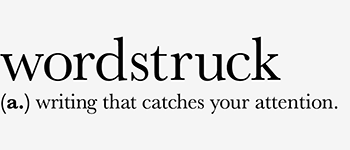
Yesterday, as I was getting ready for work, I heard a news story about a business bemoaning the poor grammar skills of their recent graduates. It seems bosses at Leeds Building Society are so concerned about workers’ written English that they have hired a teacher to give them grammar lessons.
As I arrived at the office I spotted a prominent poster with an error that would no doubt have irritated one of their senior executives. The poster exclaimed ‘Its here’. The standard form of punctuation in this context is: ‘It’s here’ – with it’s being a shortened form of it is.
Does grammar, spelling and punctuation matter?
In the case of the poster, the message can be understood, so you could argue that it’s irrelevant. But as in the argument about the building society employees, does an inattention to detail here mean sloppiness elsewhere?
As a writer I have a foot on both sides of the fence. As someone who works with words every day and who has a good understanding of the conventions of spelling, grammar and punctuation, something inside me screams out, “But it’s wrong”.
I’m aware that people can get very passionate about what’s ‘wrong’ and ‘right’ when it comes to grammar. But as a writer, I’m also aware that language changes. It evolves. Words, sentence structure and punctuation that were perfectly acceptable to a writer like Charles Dickens, would seem rather formal and verbose if I were to use them today.
We often talk about the ‘rules of grammar’ – but what are they? Where is the book that tells me what they are? The truth is, there isn’t one.
There are grammatical conventions that help us understand, for example, that although there, their and they’re sound the same, they have different spellings to help us understand that they have different meanings.
But discussions about grammar rules often lead to misconceptions, like “You can’t start a sentence with and or but”. Yes you can. And I often do. In fact I’ve done it in this paragraph.
I was lucky to have good teachers, plenty of encouragement at home and a certain amount of natural interest and aptitude for written English and I work with words every day, so I keep my skills fresh. That’s not true for everyone.
So is it fair to recruit a sales person, for example, to test them at interview on how they handle a telephone call and whether they’ll fit with your team and then criticise them when they write a customer email littered with grammatical mistakes?
Even if you were taught well, how much do you remember from your school days? If you asked me to add up a string of figures or work out a percentage, I’d be a bit stuck without a calculator. That’s partly because I prefer words to numbers, but mostly because I’m a lot out of practice.
So while it’s true that most of us use the English language every day, many of us don’t have to write it down. And just criticising someone for making a mistake, or thinking they’re stupid because they got something ‘wrong’ doesn’t help either.
If you can understand the message, does it matter? It does to me. But what about you?

It matters to me. Although there’s something terrifying about writing on this topic with this stance, knowing that there’s bound to be several mistakes in my own output. But nevermind. The point is, I care, and so should everyone involved in public communication.
I’m actually willing to forgive the occasional oversight, so long as the author was doing his or her best, but where there’s an unwillingness to take the issue seriously I treat it as bad manners, a lack of care for the feelings of the reader, and indeed as you mention, perhaps an indication of similar sloppiness in other unseen areas.
Mind you, if the apocryphal building society made some unwise investment choices, perhaps those of us who can spell should be grateful for the warning: just keep quiet, smile inwardly, and take our business next-door. Leave the sign unaltered, a shared secret for those of us who have swallowed a dictionary.
You ask whether it is fair to expect a sales person to be able to both speak appropriately on the telephone and be able to write an eloquent email. The answer is simple: yes – if you are going to expect them to write emails to your clients.
But I wouldn’t worry about your mental arithmetic; calculators are allowed*.
* as, of course, are spell-checkers and grammar-checkers, so far as they go. But don’t tell everyone.
I was quite a grammar pedant until a copy editor went through a piece of my work with a red pen- a humbling experience!
It helped me realise that we all have different levels of education, different levels of skill and different levels of interest. These combine to result in a varying scale of literacy.
Now I am much more forgiving when I see people make SPG mistakes. Maybe they’re dyslexic. Maybe their education wasn’t as rigorous as mine. Maybe they’re much more socially adept than me, or mathematically minded, and their strengths lie elsewhere. Maybe their thoughts are on much loftier things than mine!
I am not so tolerant of mistakes in a professional context, however. When it comes to printed materials, shop signs, public statements etc, I believe that these things should be carefully checked by an expert
If you’re a small business and it’s not your skill set, this is absolutely when you need to call on the services of a professional copyeditor or writer. It’s money well spent, in my opinion.